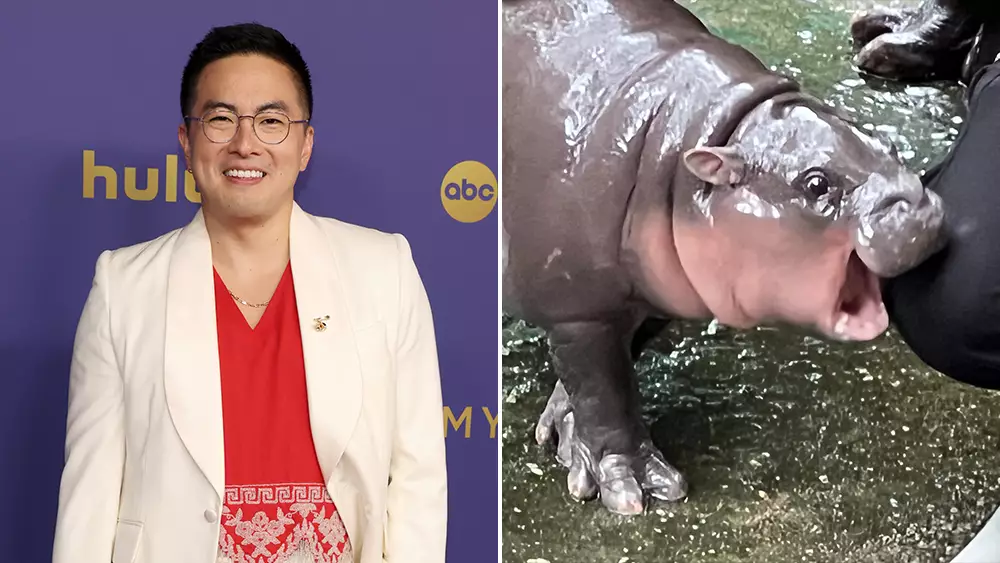In a season premiere that turned heads and sparked discussions, Saturday Night Live introduced viewers to Moo Deng, a pygmy hippopotamus, through the playful yet poignant performance of Bowen Yang. Clad in an exaggerated purple animal suit, Yang’s portrayal went beyond mere entertainment; it served as a social commentary about boundaries, representation, and the sometimes harsh realities faced by those in the spotlight—both human and animal.
The absurdity of a hippo calling for justice was not lost on the audience. However, Yang’s character came with a powerful message. Many might view such performances as light-hearted escapism, but they often mask deeper societal issues. Moo Deng’s monologue during the “Weekend Update” segment conveyed the frustration of being a public figure subjected to incessant scrutiny and demands for emotional labor, particularly highlighting how visitors often blur the lines between entertainment and entitlement. Yang’s declaration, “Reminder: Women owe you nothing!” resonated beyond the context, touching upon the often-overlooked pressures faced by individuals—especially women—in the public eye.
Bringing Attention to Important Issues
Moo Deng’s call for personal space is a nod to the broader public discourse surrounding harassment. In a world increasingly driven by social media and “parasocial” relationships, where followers often feel a sense of personal connection to celebrities, Moo Deng’s lament serves as a sobering reminder of the detrimental effects of such dynamics. This skit skillfully turned a fancy-dress character into a symbol of protest, with Yang encapsulating layers of frustration that so many individuals experience when their identities are commodified for entertainment.
Yang’s clever quips added both humor and depth to the performance. For instance, when asked about Moo Deng’s ‘talent,’ he humorously replied, “Having a slippery body that bounces,” illustrating that the expectations placed on celebrities can sometimes be frivolous and reductive. This comedic yet critical approach is emblematic of SNL’s legacy—using satire to not only entertain but also to challenge viewers’ perspectives on societal norms.
The Underlying Context: Representation and Misrepresentation
Moreover, Yang pointedly noted that before Moo Deng, the only representations of hippos were largely frivolous, linked predominantly to children’s games and animation. This commentary underscores an often suppressed issue: the lack of authentic and diverse representation across the media landscape. In a world that craves depth and realism, this critique is essential. Whether in terms of gender, race, or species, representation matters. Yang’s assertion that he was “your favorite hippo’s favorite hippo” was an affirmation of Moo Deng’s newfound complexity, elevating the discussion about how marginalized perspectives can exist even in whimsical scenarios.
The skit also cleverly intertwined references to social justice, as Moo Deng’s refusal to endorse a presidential election echoed the sentiments of many disillusioned voters today. Yang’s line, “Ugh, I’m getting stressed out again Colin, can I bite your knee?” not only provided a comedic relief but also subtly acknowledged the escalating stress many feel in our current political climate. This melding of humor and truth is where SNL shines—capturing the zeitgeist while forcing viewers to confront uncomfortable realities.
Ultimately, Moo Deng emerged as more than a comedic character; he became a resonant voice for those who feel marginalized and overexposed. Yang’s spirited performance encapsulated the struggles associated with fame and the complexities of representation, reminding us that even the most playful narratives can resonate with pressing societal issues. As viewers laughed at the antics of a hippo beseeching for respect, they were also invited to reflect on broader themes of boundary-setting, representation, and the often unrecognized emotional labor required of public personas. SNL successfully heightened awareness, proving once again that laughter can be a powerful vehicle for social change.

Leave a Reply